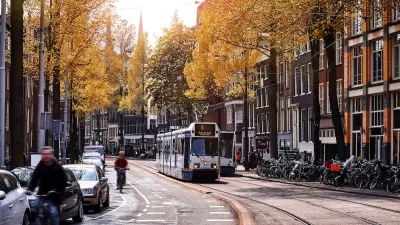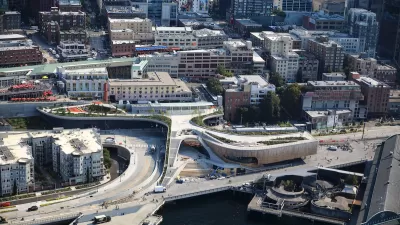This article considers the impacts of driverless cars, or autonomous vehicles, on bicycle planning and what a 'low stress' bicycle route may look like in the future.

There has been a lot of talk recently on the planning impacts of self driving cars, or autonomous vehicles as some call them. There is a recent CBC piece which summarizes many of the issues.
Although there are many planning issues surrounding self driving cars, for a moment I want to focus on bicycle planning. Here in Vancouver, creating cycle routes ‘for all ages and abilities’ has become a focus for Council. In order to do this, the focus has been on the creation of physically separated bike lanes. The design is intended to protect cyclists from the physical danger of vehicles. Or rather, the danger of people driving cars who are not paying as much attention as they should.
But an all seeing, all obeying computer driven car could presumably behave much better. It could be programmed to travel at, say, 20 kph on designed ‘low stress bicycle routes’ and be programmed to give people cycling the right of way. it could avoid certain streets altogether unless required to access a destination.
Instead of having to create separate spaces for different types of street-users because they are incompatible in some way, handing over control of vehicles to computers surely presents the opportunity for safe, low stress shared spaces. There are many planning advantages to this including narrower, more friendly feeling streets, making more efficient use of space.
We would of course have to trust the technology and this will not happen overnight. if you’re out cycling with your eight year old, do you really trust that Google powered autonomous vehicle to react in time when your child swerves out into its path?
We don’t know how the future will evolve. However, I believe it is important to start thinking through some of these scenarios so we’re better prepared as professionals and advocates when these questions and issues inevitably arise down the line.
FULL STORY: Impacts of self driving cars on bicycle planning

Alabama: Trump Terminates Settlements for Black Communities Harmed By Raw Sewage
Trump deemed the landmark civil rights agreement “illegal DEI and environmental justice policy.”

Study: Maui’s Plan to Convert Vacation Rentals to Long-Term Housing Could Cause Nearly $1 Billion Economic Loss
The plan would reduce visitor accommodation by 25% resulting in 1,900 jobs lost.

Planetizen Federal Action Tracker
A weekly monitor of how Trump’s orders and actions are impacting planners and planning in America.

DC Extends Application Window for Outdoor Dining Permits
District restaurants will have until the end of November to apply, but businesses with permits in rush hour parking lanes must end operations on July 31.

Wind Energy on the Rise Despite Federal Policy Reversal
The Trump administration is revoking federal support for renewable energy, but demand for new projects continues unabated.

Passengers Flock to Caltrain After Electrification
The new electric trains are running faster and more reliably, leading to strong ridership growth on the Bay Area rail system.
Urban Design for Planners 1: Software Tools
This six-course series explores essential urban design concepts using open source software and equips planners with the tools they need to participate fully in the urban design process.
Planning for Universal Design
Learn the tools for implementing Universal Design in planning regulations.
Caltrans
Smith Gee Studio
Institute for Housing and Urban Development Studies (IHS)
City of Grandview
Harvard GSD Executive Education
Toledo-Lucas County Plan Commissions
Salt Lake City
NYU Wagner Graduate School of Public Service





























